Dickens' Women (3 page)
Authors: Miriam Margolyes

That is the story Dickens wanted heard, his interpretation of the breakdown of the marriage. He would go to any lengths to keep the truth from his Public: that he had made his wife pregnant twelve times, that he had grown tired of her and had been joyously inflamed by a younger, slenderer woman.
But, of course, there is the other Dickens, the jolly man more familiar to the public, and I would be doing Dickens a disservice if I omitted the humour for which he is justly famous. Here are two gems I relish, examples of the smaller characters he would so expertly give life to. In the first, from
Martin Chuzzlewit
(1843â44), the landlady, Mrs Todgers, talks to the Pecksniff daughters.
âPresiding over an establishment like this, makes sad havoc with the features, my dear Miss Pecksniffs,' said Mrs Todgers. âThe gravy alone, is enough to add twenty years to one's age, I do assure you.'
âLor!' cried the two Miss Pecksniffs.
âThe anxiety of that one item, my dears,' said Mrs Todgers, âkeeps the mind continually upon the stretch.
There is no such passion in human nature, as the passion for gravy among commercial gentlemen. It's nothing to say a joint won't yield â a whole animal wouldn't yield â the amount of gravy they expect each day at dinner. And what I have undergone in consequence,' cried Mrs Todgers, raising her eyes and shaking her head, âno one would believe!'
And the glorious Mrs Wititterley in
Nicholas Nickleby
, from a higher class but equally hilarious:
âI take an interest, my lord,' said Mrs Wititterly, with a faint smile, âsuch an interest in the drama.'
âYe-es. It's very interesting,' replied Lord Verisopht.
âI'm always ill after Shakespeare,' said Mrs Wititterly. âI scarcely exist the next day; I find the reaction so very great after a tragedy, my lord, and Shakespeare is such a
delicious
creature.'
âYe-es!' replied Lord Verisopht. âHe was a clayver man.'
âDo you know, my lord,' said Mrs Wititterly, after a long silence, âI find I take so much more interest in his plays, after having been to that dear little dull house he was born in! Were you ever there, my lord?'
âNo, nayver,' replied Verisopht.
âThen really you ought to go, my lord,' returned Mrs Wititterly, in very languid and drawling accents. âI don't know how it is, but after you've seen the place and written your name in the little book, somehow or other you seem to be inspired; it kindles up quite a fire within one.'
I am convinced that the way to read Dickens is to read him aloud, just as Dickens himself did when he wrote standing at his desk, wiping his eyes with laughter, then running to the mirror to practise his faces and weeping as he killed off Little Nell.
John Forster writes in his Biography: âhe is said on one
occasion
to have declared to the critic that every word uttered by his characters was distinctly
heard
by him before it was written down'.
Dickens makes it easy to find the voices for his characters; Mrs Gamp's dialogue, for example, is written using the letter âg' instead of âs' so I knew exactly how to pronounce âwhen I am so dispoged' and could gauge the level of drunkenness to employ for this vicious, sublime creation. Mrs Micawber's voice surprised me. She is often presented unsympathetically, being both harsh and stupid, but I heard her as an anxious woman, desperately searching for gentility and public recognition of her pre-marital status. The piece in the script is quite touching; often I could hear the audience weeping as I said âI never will'.
I am brave enough to present three males in the show â Pip, Towlinson and Mr Bumble. Mr Bumble pushed his way into the show and I have to admit he is enormous fun to play. The combination of amorousness and cupidity which Dickens so brilliantly displays in the scene with the teaspoons gave me the unctuous voice for this obese predator.
I hope, as you read the script of
Dickens' Women
, you will enjoy Flora Finching, Mrs Corney and all the others as much as I enjoy performing them and perhaps will find a voice for them yourselves.
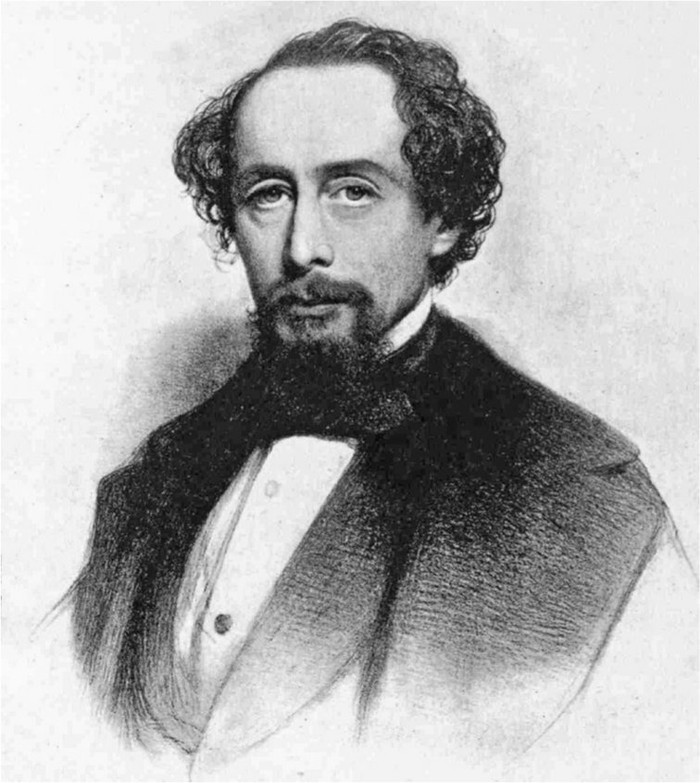
Charles Dickens
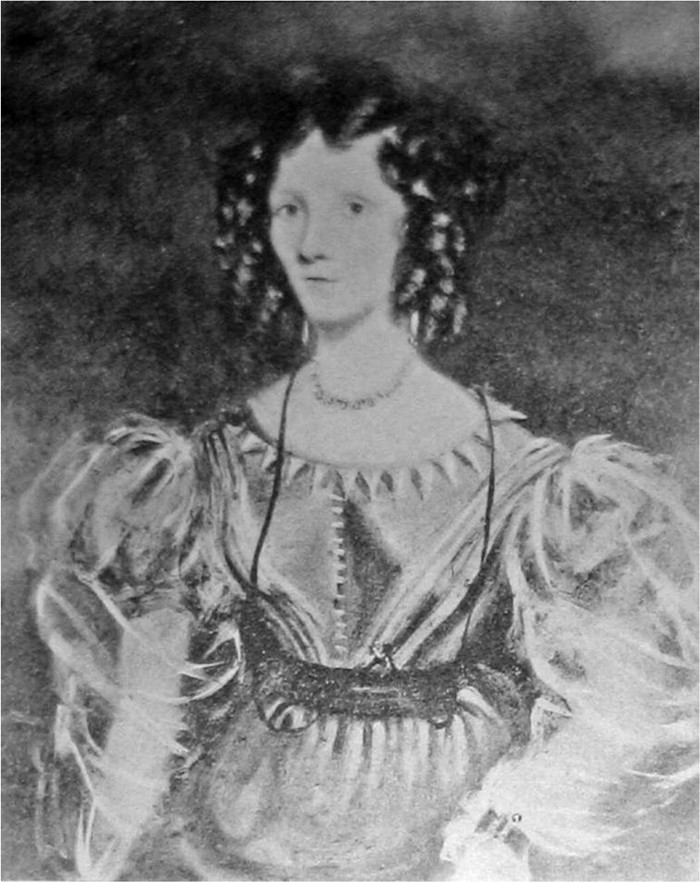
Elizabeth Dickens â Charles Dickens' mother
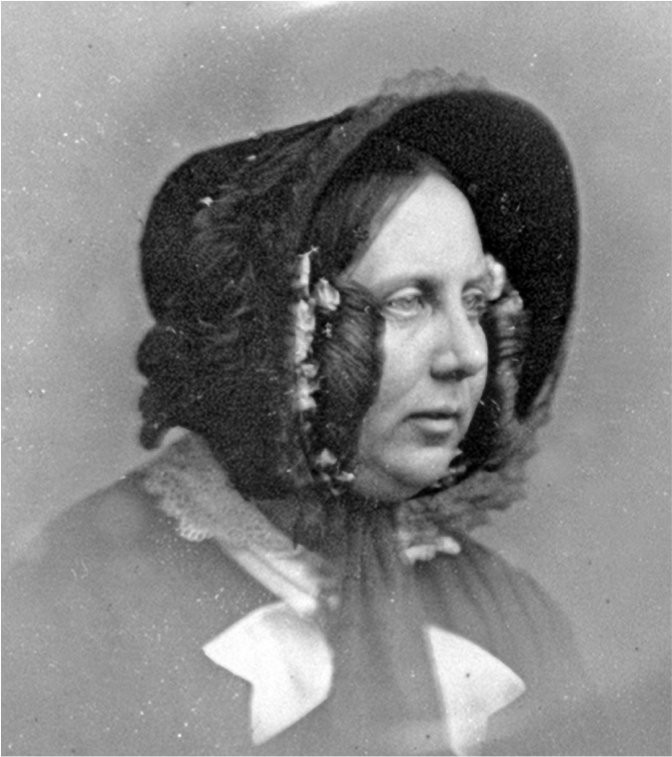
Catherine Dickens â Charles Dickens' wife
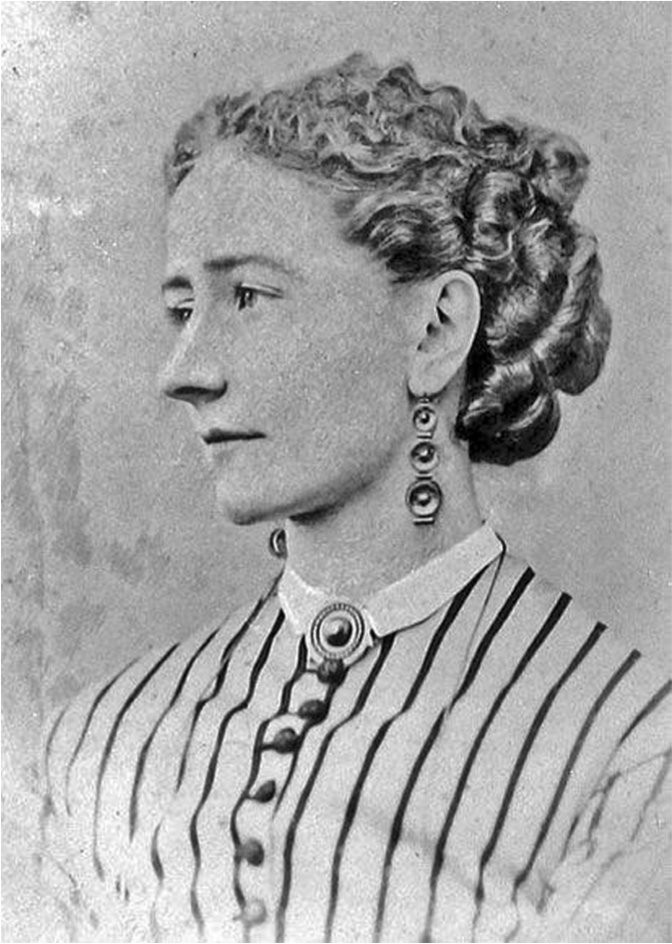
Ellen Ternan â Charles Dickens' mistress
âI'm coming. Is it Mrs Perkins? What, Mr Whilks! Don't say it's you, Mr Whilks, and that poor creeture Mrs Whilks with not even a pincushion ready. Don't say it's you, Mr Whilks! And so the gentleman's dead, sir! Ah! The more's the pity. But it's what we must all come to. It's as certain as being born, except that we can't make our calculations as exact. Ah! Poor dear!
âAh dear! When Gamp was summonsed to his long home, and I see him a lying in the hospital with a penny-piece on each eye, and his wooden leg under his left arm, I thought I should have fainted away. But I bore up. If it wasn't for the nerve a little sip of liquor gives me I never could go through with what I sometimes has to do.
â“Mrs Harris,” I says to my friend Mrs Harris at the very last case as ever I acted in, which it was but a young person, â “Mrs Harris,” I says, “leave the bottle on the chimley-piece, and don't ask me to take none, but let me put my lips to it when I am so dispoged, and then I will do what I am engaged to do, according to the best of my ability.”
â“Mrs Gamp,” she says in answer, “if ever there was a sober creeture to be got at eighteen-pence a day for working people, and three and six for gentlefolks â night-watching being a extra charge â you are that inwallable person.”
â“Mrs Harris,” I says to her, “don't name the charge, for if I could afford to lay all my fellow-creeturs out for nothink, I would gladly do it, sich is the love I bears 'em.”
âThank you sir. How are you Mr Mould? Everything be nice and comfortable about the deceased. You know me of old, I hope, and so does Mrs Mould, your 'andsome pardner sir and so does the two sweet, young ladies, your darters; although the blessing of a daughter was deniged myself, which if we had one, Gamp would certainly have drunk its little shoes right off its feet.
âBut them two sweet, young ladies of yourn, Mr Mould, as I knowed afore a tooth in their pretty heads was cut, and have many a time seen â ah! the dear creeturs! a-playing at berryins down in the shop and a-follerin' the order-book to its long home in the iron safe. Young ladies with such faces as your darters thinks of somethin' else besides berryins'; don't they, sir? Thinks o' marryin's; don't they, sir?
âYou ought to know that you was born in a wale, and that you live in a wale, and that you must take the consequences of sich a sitivation.
âI takes new bread, my dear, with jest a little pat o' fredge butter and a morsel o' cheese: and whatever you do, young woman, don't bring me more than a shillingsworth of gin-
and-water
, when I rings the bell a second time; for that is always my allowange, and I never takes a drop beyond.
âRich folk may ride on camels, but it ain't so easy for them to see out of a needle's eye. That is my comfort and I hopes I knows it. Drat the old wexagious creetur, I a'most forgot your piller, I declare! There! Now you're as comfortable as you need to be, I'm sure! and I'm going to be comfortable too.'
Seated in the chair asleep. Opens eyes
.]
That was Mrs Gamp from
Martin Chuzzlewit
, and I am Miriam Margolyes from Clapham.
Mr Mould the undertaker was a great admirer of Mrs Gamp. He said she was âthe sort of woman you would bury for nothing and do it neatly'.
I've had a passion for Dickens all my life. I learnt from him that literature is not peripheral to life: it is the stuff of life itself. Dickens distilled his life's experience into the most marvellous essence and particularly the women in his life fuelled the women in his books. I want to share with you my relish in their humour, their variety, their vitality. Everybody thinks of Dickens as the warm, jolly, family man, the
paterfamilias
, the inventor of Christmas. âGod Bless us every one,' says Tiny Tim.
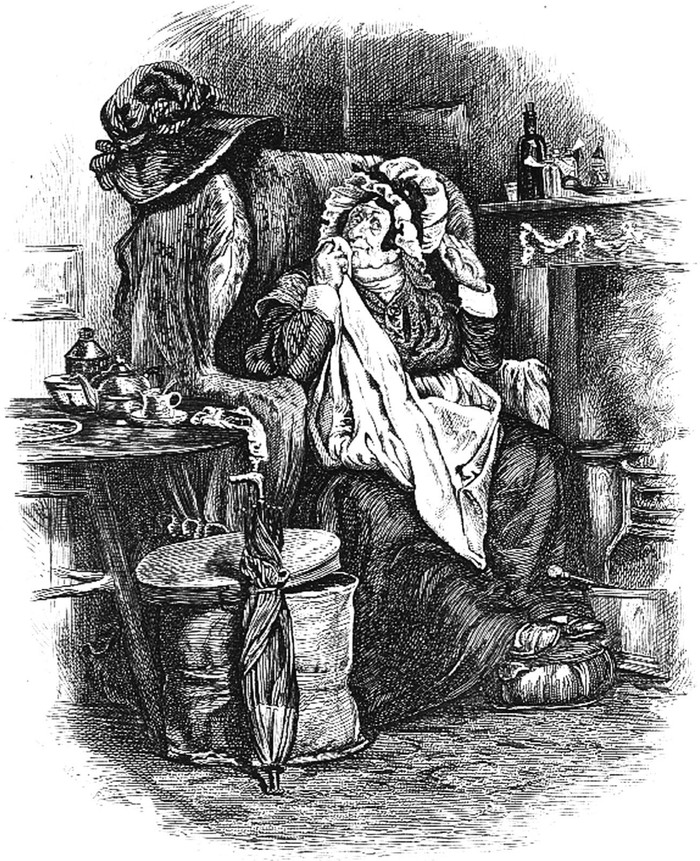
Mrs Gamp â Fred Barnard, 1879
Music under
.]
But there was a tormented, demonic side to his nature that had its roots in the darkness of his childhood.
Kate Perugini, his favourite daughter, wrote to George Bernard Shaw, âIf you could make the public understand that my father was not a jolly, jocose gentleman walking about the earth with a plum pudding and a bowl of punch, you would greatly oblige me.' I want to oblige Kate tonight.
Dickens could write about the gripe of poverty, about people living on the underbelly of life, on the edge of existence because he had been there himself.
Do you know the Klems from
The Uncommercial Traveller
?
I am waited on by an elderly woman with a chronic sniff, who, at the shadowy hour of half past nine o'clock of every evening, gives
admittance
at the street door to a meagre and mouldy old man whom I have never yet seen detached from a flat pint of beer in a pewter pot.
The meagre and mouldy old man is her husband, and the pair have a dejected consciousness that they are not justified in appearing on the surface of the earth.
They come out of some nook when London empties itself and go in again when it fills. They make their bed in the lowest and remotest corner of the basement and they smell of bed, and have no possessions but bed: unless it be (which I rather gather from an undercurrent of flavour on them) cheese.
The most extraordinary circumstance I have traced in
connection
with this aged couple is that there is a Miss Klem, their daughter, apparently ten years older than either of them, who also has a bed and smells of it, and carries it about the earth at dusk and hides it in deserted houses.
I came into this piece of knowledge through Mrs Klem's beseeching me to sanction the sheltering of Miss Klem under that roof for a single night, âbetween her takin' care of the upper part in Pall Mall which the family of his back, and a 'ouse in Serjameses-Street, which the family of leaves town ter-morrer'.
I gave my gracious consent, and in the shadowy hours Miss Klem became perceptible on the doorstep wrestling with a bed in a bundle. Where she made it up for the night I cannot positively state, but I think in a sink. I know that with the instinct of a reptile or insect, she stowed it and herself away in deep obscurity.
Music
.]
This vaguely ecclesiastical structure is a copy of Dickens' own reading desk, which he designed himself and toured with all over England and America with his dramatic readings. These were immensely successful: in 1868, when he went to New York, over 25,000 people came to hear him, and he made far more money out of his readings than he ever did out of his writings.
I suppose most people's view of a typical Dickens heroine is somebody like Pet Meagles from
Little Dorri
t. âPet was about twenty. A fair girl with rich brown hair hanging free in natural ringlets. A lovely girl, with a frank face, and wonderful eyes; so large, so soft, so bright, set to perfection in her kind, good head. She was round and fresh and dimpled and spoilt, and there was in Pet an air of timidity and dependence which was the best weakness in the world.'
Music
.]
And then there's Kate Nickleby from
Nicholas Nickleby
:
âA slight but very beautiful and gentle girl of about
seventeen
.'
Mary Graham (from
Martin Chuzzlewit
),
no more than
seventeen
, her figure slight as became her years but all the charms of youth and maidenhood clustered on her gentle brow.
Ada Clare (from
Bleak House
),
with the fire shining on her, a beautiful girl of seventeen with such soft, blue eyes and such a bright, innocent, and trusting face.
And Alice (from
The Sisters of York
),
a fair creature of
seventeen
. The heart of this fair girl bounded with youth and gladness, her gleesome voice and merry laughs were the sweetest music of their home. She was its very light and life.
End music
.]
Have you noticed they're all about seventeen? That is because they were all based on Mary Hogarth, Dickens' young
sister-in-law
, who came to live with Dickens and his wife Catherine when they were first married. And the important thing to remember about Mary is that she died⦠at seventeen. They had been to the St James's theatre together â all three of them: Dickens loved to go out with a sister on each arm; he called them âmy pair of petticoats, my two Venuses', and they'd come home, happy and laughing; Mary had gone upstairs to take off her cloak, Dickens was walking upstairs behind her and suddenly she fell back into his arms â and died.
He had a pathological attachment to her: he wrote, âher last words were of me. I have lost the dearest friend I ever had⦠she had not a single fault and was in life almost as far above the foibles and vanity of her sex and age as she is now in Heaven.'
He wanted to be buried in the same grave with her, and was most upset when her younger brother died first and was buried there instead.
âIt is a great trial to me to give up Mary's grave, greater than I can express. I thought of having her moved to the catacombs
and saying nothing about it⦠I cannot bear the thought of being parted from her dust.'
He composed the epitaph for her tombstone in Kensal Green cemetery, âYoung, beautiful, and good, God numbered her with his angels at the tender age of seventeen,' and she became in his writing the pregenitor of all those tiny, little, pre-pubescent, mini-breasted, child love-objects, like Dora, Ruth Pinch, Little Dorrit, Florence Dombey, Little Em'ly, and of course the most famous of all, Little Nell. I find them all rather icky, actually. So did Oscar Wilde.
He wrote: âOne would have to have a heart of stone to read the death of Little Nell without laughingâ¦'
And G.K. Chesterton, a brilliant Dickens commentator, wrote: âAround Little Nell, of course, a controversy raged and rages. Some implored Dickens not to kill her at the end of the story. Some regret that he did not kill her at the beginning.'
So I thought it would be nice to show Little Nell having some fun for a change (before she died) with Mrs Jarley, the owner of the Waxworks, from
The Old Curiosity Shop
.
Music
.]
Mrs Jarley:
The Old Curiosity Shop
âThere, child, read that.'
Nell walked round and read aloud the inscription, in enormous black letters, JARLEY'S WAX WORK.
âI never saw any wax-work, ma'am,' said Nell. âIs it funnier than Punch?'
âFunnier!' said Mrs Jarley in a shrill voice. âIt is not funny at all.'
âOh!' said Nell, with all possible humility.
âIt isn't funny at all,' repeated Mrs Jarley.
âIt's calm and â what's that word again â critical? â no â classical, that's it â it's calm and classical. No low beatings and
knockings about, no jokings and squeakings like your precious Punches, but always the same, with a constantly unchanging air of coldness and gentility; and so like life, that if wax-work only spoke and walked about, you'd hardly know the difference.
âI won't go so far as to say, that, as it is, I've seen wax-work quite like life, but I've certainly seen some life that was exactly like wax-work.
âThat, ladies and gentlemen, is Jasper Packlemerton of
atrocious
memory, who courted and married fourteen wives and destroyed them all by tickling the soles of their feet when they was sleeping in the consciousness of innocence and virtue.
âOn being brought to the scaffold and asked if he was sorry for what he had done, he replied yes, he was sorry for having let 'em off so easy and hoped all Christian husbands would pardon him the offence.
âLet this be a warning to all young ladies to be particular in the character of the gentlemen of their choice.
âObserve that his fingers is curled as if in the act of tickling, and that his face is represented with a wink, as he appeared when committing his barbarous murders.'
When Nell knew all about Mr Packlemerton and could say it without faltering, Mrs Jarley passed on to the fat man, and then to the thin man, the tall man, the short man, the old lady who died of dancing at a hundred and thirty-two, the wild boy of the woods, the woman who poisoned fourteen families with pickled walnuts, and other historical characters and interesting but misguided individuals.
âFinally, that,' said Mrs Jarley, âis an unfortunate Maid of Honour in the time of Queen Elizabeth, who died from pricking her finger in consequence of working upon a Sunday.
âObserve the blood which is trickling from her finger; also the gold-eyed needle of the period with which she is at work.'
Music
.]
Dickens came from the lower middle class and he hated it. The anatomy of our English class system is such that the lower middle class is probably the worst class to be born into â because it lacks both the dignity of the working class and the confidence, the security of the middle class and anyone who has the
misfortune
to be born into the lower middle class can spend a lifetime trying to claw their way out of it⦠Dickens was a passionate and a determined and ultimately a successful social climber.